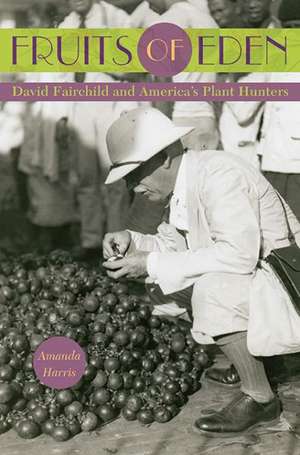Fruits of Eden: David Fairchild and America's Plant Hunters
Autor Amanda Harrisen Limba Engleză Hardback – 20 apr 2015
If you have ever wondered how navel oranges and other such foods came to be grown in America, here's the answer. "Fruits of Eden" is a welcome history of these little-known plant experts who succeeded in improving the diversity and deliciousness of our daily fare. Marion Nestle, author of "Food Politics: How the Food Industry Influences Nutrition and Health"
A fascinating account of our greatest agricultural explorer, who battled almost every imaginable peril so that American farmers could grow foods like mangoes, avocados, figs, and dates. David Karp, University of California
David Fairchild (1869 1954), son-in-law of Alexander Graham Bell and brother-in-law of "National Geographic" editor Gilbert Grosvenor, shared the contagious spirit of scientific discovery and invention that characterized the late nineteenth century. Like his influential relatives, Fairchild introduced revolutionary changes not in technology or geography but in the American diet.
At a time when much American fare tended to be bland, Fairchild believed in the free exchange of food plants preferably colorful, tasty ones among people around the world. He convinced the U.S. Department of Agriculture to sponsor daring overseas explorations to track down and bring back foreign cultivars. Fairchild traveled to remote corners of the globe, searching for fruits, vegetables, and grains that would transform the American diet.
In "Fruits of Eden," Amanda Harris vividly recounts the exploits of Fairchild and his small band of adventurers and botanists as they traversed Africa, Asia, South America, and Europe. They searched remote jungles, desert oases, and mountain valleys to return with new and exciting plants packed with flavor. Their findings led to a renaissance not only at the dinner table but also in horticulture, providing diversity of crops and economic growth for farmers across the country.
But not everyone supported this burgeoning form of globalization. In the early twentieth century the scientific community began to be concerned about invasive species. World War I fanned the flames of xenophobia in Washington, and adversaries believed Fairchild s discoveries would contaminate the purity of native crops. As Fairchild s work became tangled in these and other controversies, his government expeditions ceased Yet his legacy lives on in today s modern kitchen, where navel oranges, Meyer lemons, honeydew melons, soybeans, avocados, and many other once-exotic foods are now savored with delight.
"
Preț: 201.14 lei
Preț vechi: 218.30 lei
-8% Nou
Puncte Express: 302
Preț estimativ în valută:
38.49€ • 39.71$ • 32.12£
38.49€ • 39.71$ • 32.12£
Carte indisponibilă temporar
Doresc să fiu notificat când acest titlu va fi disponibil:
Se trimite...
Preluare comenzi: 021 569.72.76
Specificații
ISBN-13: 9780813060613
ISBN-10: 0813060613
Pagini: 312
Dimensiuni: 172 x 231 x 24 mm
Greutate: 0.64 kg
Editura: University Press of Florida
ISBN-10: 0813060613
Pagini: 312
Dimensiuni: 172 x 231 x 24 mm
Greutate: 0.64 kg
Editura: University Press of Florida
